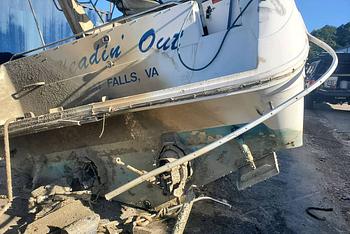Buying a boat is the start of an exciting journey. Once you’ve made the decision to buy – whether a new boat or used boat – you’ll be itching to get going. It can be a long process from starting your searches to setting sail for the very first time, but if you know what to expect and keep your end goal in sight it can be a fun one too. Evenings spent trawling the enticing boats on selling sites such as Rightboat.com, and weekends visiting boats in marinas will whet your appetite for the boating lifestyle – whether you want to Sail around the world, live on your boat year round, or have it as a family day cruiser. But before you get there, you’ll need to agree on a price. No-one wants to pay any more for a boat that they have to, and there are many factors to take into account.
So we have compiled some useful tips to have you negotiating like a pro and securing yourself the very best deal.
Do Your Research
Whether you’re buying a new or used boat, it’s important to know the true value of the boat by comparing it with other similar models. Look online at other boats on the market and see how the pricing matches to the one you have your eye on. Of course, age and condition will play a role in different boat’s values, but do your homework and go armed with print outs to help negotiations. Keep in mind that the vendors are likely to be emotionally attached to their boat and will, therefore, think it’s worth more than similar examples. Having them printed (or links to forward on) can be a good negotiation tool.
Don’t Be Swayed by a Long List of Equipment
An impressive list of onboard equipment can be enticing. While on new boats this can be a real bonus, when buying a used boat keep in mind it is likely that a lot of the equipment will need replacing or maintenance. Cosmetics and equipment lists have long been used as a tool to sell boats, so try and disregard them and focus on the boat itself. Calculate how much you would need to spend on replacing or upgrading the listed equipment. Then you can ask the vendor or broker to have the items removed and lower the price accordingly.
Calculate the Cost of Repairs
As part of the long process of buying a used boat, you’ll want to have a marine survey carried out. Ask the surveyor to be thorough, and give you a detailed list of everything which needs repairs. You can also make a list yourself as you look around the boat, noting down any superficial damage which won’t be highlighted in the survey. Make a note of everything you would need to repair – from ripped cushions to cracked wood, and dents in the fiberglass. Calculate with reasonable figures how much each repair would cost and then tell the seller that you’ll pay the asking price if they have all of the things on your list fixed beforehand. It’s unlikely they will want to undertake the work, so at this point, you can suggest lowering the price by the total cost of the work and doing it yourself.
Try Not to be Emotional
Buying a boat is an emotional journey and one you’ll want to enjoy and get excited about. For the best chance at negotiating, however, try and leave your emotions outside and focus on the figures and facts. It’s easier said than done, but when a seller or broker knows you are passionate about their boat and are unlikely to walk away from it, you’ll be on the back foot when it comes to the negotiating the price.
It’s also important to set yourself a maximum figure you’re willing to pay and stick to it. You wouldn’t be the first to pay over the odds for a boat because you’ve fallen in love. When you’ve signed the paperwork and closed the deal that is the time to pop the champagne and start celebrating!
Be Patient
Which leads us on to the next point: be patient! Buying a boat, new or used, can be a long process. It might take months to find the right boat. But don’t get despondent and impatient, because that’s when poor decisions are made. You may settle for the wrong type of boat for your needs, or convince yourself to pay more for a boat than it’s worth. At the end of a long journey searching for a boat, finding one you like, getting the survey completed, and checking the paperwork, you may be itching to close the deal and sail off into the sunset. Don’t get impatient at the final hurdle: negotiating the price. Be prepared for several rounds of offers and counter-offers, and keep in mind that the seller will be keener to sell than you are to buy.
Take Along a Professional
If you’re a first-time boat buyer you may find that a lot of the terminology can be baffling. What’s the difference between a staysail and Yankee, or a halyard and a sheet you may ask? If you don’t know the answer, be sure to ask someone who does. In fact, taking someone with extensive boating knowledge along with you to negotiations can ensure you don’t feel bamboozled by the terminology and know exactly what it is you’re negotiating on. Asking questions is important right from the get-go. Don’t simply ask why the boat is for sale, ask how much sea time it has had in the past five years, where it has cruised to, how much maintenance it’s had and so forth. The more information you have the better position you will be in when it comes to negotiating a fair price.
Negotiate on Extras
After some to and fro-ing of offers and counter-offers, you might find you’re at a stalemate. The seller doesn’t want to drop the price any further but it’s still slightly more than you think it’s worth. Then consider asking for some extras which would otherwise cost you money. A good example is hard standing storage. If the boat is already on hard standing, ask if it can remain there during the winter season at no cost to you. It’s likely the seller has paid for winter storage in advance and would be willing to agree to this. Brokers too might be able to offer marina berths or winter storage. Another area for negotiation is transport. You could ask that the seller or broker bring the boat to where you would like it kept – often this can be arranged and will save you some extra pennies.
Start your boat-buying journey at Rightboat.com where you’ll find thousands of new and used boats for sale, all around the world, to choose from.




